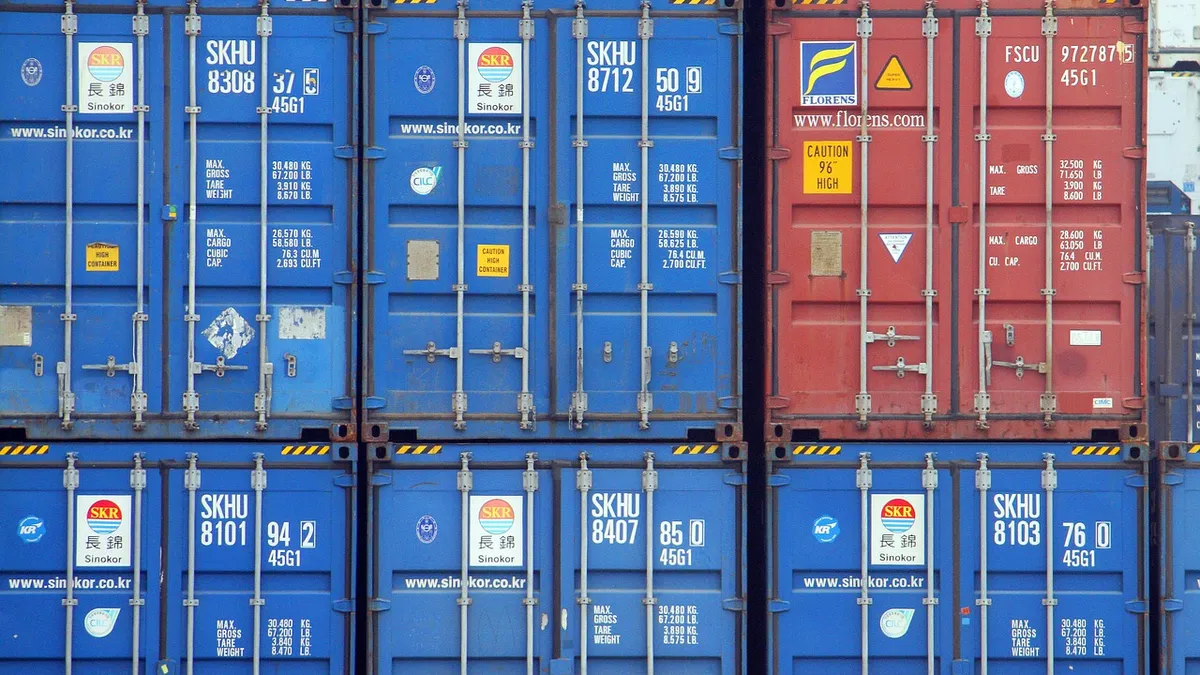Dive Brief:
- Estimates from the World Trade Organization (WTO) show global merchandise trade declining in every region of the world and across most sectors of the economy in 2020. In an optimistic scenario, global trade would decline by 13% year over year (YoY) — about the same as the drop seen during the Great Recession, the WTO said. In a pessimistic scenario, trade would drop 32% or more YoY, similar to what occurred during the Great Depression over three years. The wide margin between scenarios is due to "the unprecedented nature" of the coronavirus pandemic, the WTO said. But the organization predicts trade levels will likely be worse than they were during the Great Recession.
- WTO said estimates about recovery are also uncertain. "If the pandemic is brought under control relatively soon, and the right policies are in place, trade and output could rebound nearly to their pre-pandemic trajectory as early as 2021 — regardless of how steep the initial fall is. But there are other scenarios in which trade volumes post-recovery would remain below the pre-COVID trendline," WTO Director-General Roberto Azevêdo said in a press conference Wednesday.
- A drastic drop in trade will directly affect trucking companies moving intermodal freight. "It will impact us in a big way," Texas Trucking Association President and CEO John Esparza told Transport Dive in an interview Wednesday. "We're going to brace ourselves for another downturn."
Dive Insight:
As the coronavirus changes consumer demand and the world economy at large, intermodal is feeling the brunt. Trucks that are not hauling essential supplies are sidelined and looking to the federal stimulus bill to provide financial relief. Rail is in the midst of a 12% year-over-year drop in carloads. Even lower trade volumes would further compound the lack of business.
Azevêdo noted that global merchandise trade fell significantly during the final quarter of 2019, "largely due to uncertainties that we had been seeing in the international economy, to the trade tensions that were out there," he said.
Not coincidentally, reports from DAT, Cass and the American Trucking Associations late last year showed shippers were holding off on contracts due to tumbling spot rates. Cass' report specifically called out the state of trade, reporting, "The weakness in spot market pricing for many transportation services, especially trucking ... strengthens our concerns about the economy and the risk of ongoing trade policy disputes."
Although trucking is cyclical and businesses are accustomed to varying demand, a year that turns out like either of WTO's scenarios spells trouble.
"When trade is impacted, and the ports start to slow down, you start laying people off," Esparza said. "I think [a trade slump] is a severe impact to everyone, but the owner-operator is now more so on his own to adjust to freight."
Azevêdo said supply chains essentially have two ways to respond to the coronavirus disruption: diversifying or reshoring. But he warns against the latter.
"It will be the wrong response for several reasons. First because, as I have said before, no matter how strong or how advanced a country is, they're never going to be self sufficient," he said. He used the current state of medical supplies as an example. Supply chains are being squeezed hard now that the general public is familiar with personal protective equipment. "The right answer is to cooperate, to have international trade functioning properly. And in times like these, where we need more international coordination, make sure that those supplies continue to work and function as closely to normal as possible."
Trade tensions in 2019 caused supply chains to diversify away from China, pushing Kearney's manufacturing import ratio (MIR) to 98%, up from -32% in 2018. But the MIR's increase does not indicate companies are coming back to the U.S. Domestic manufacturing output was "virtually unchanged" from 2018, Kearney said, while firms reduced imports from China and increased imports from other Asian countries and Mexico.
Along with diversifying the supply chain, WTO Chief Economist Robert Koopman suggested planning could help ward off a worst-case scenario.
"Plan for the next pandemic or, or natural disaster. It could be a hurricane; it could be an earthquake; it could be an industrial accident that hits your domestic supply chain, not just your international supply chain," he said. "So, you need to think about, how do firms manage their inventories? Maybe they need to have a little bit more flexibility both in terms of diverse supply sources, but perhaps they carry a bit more inventory than they've been using recently."














